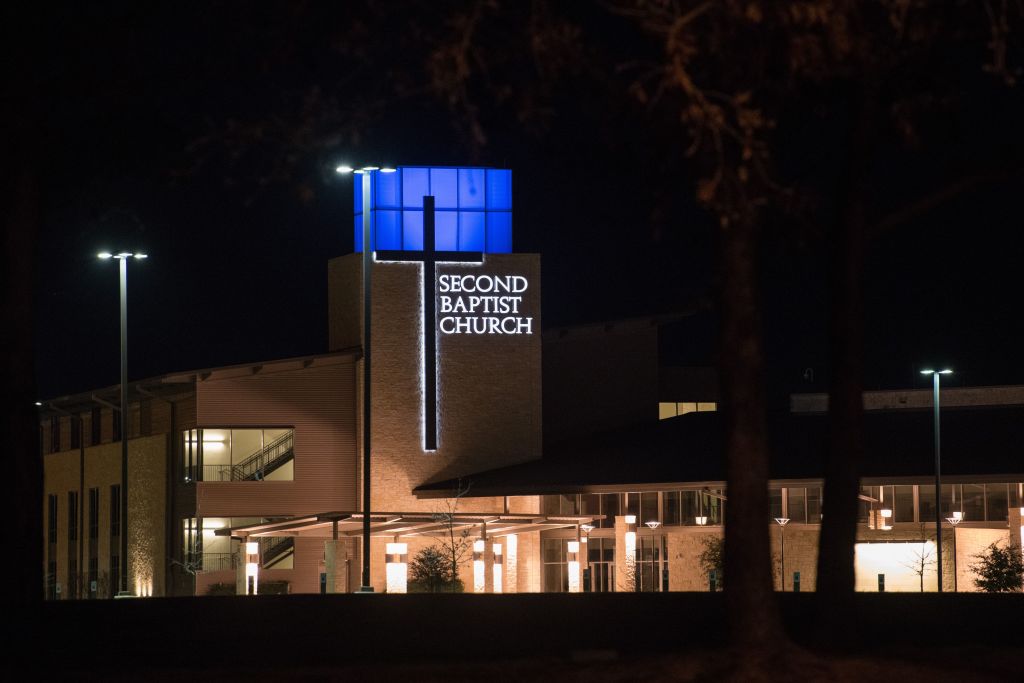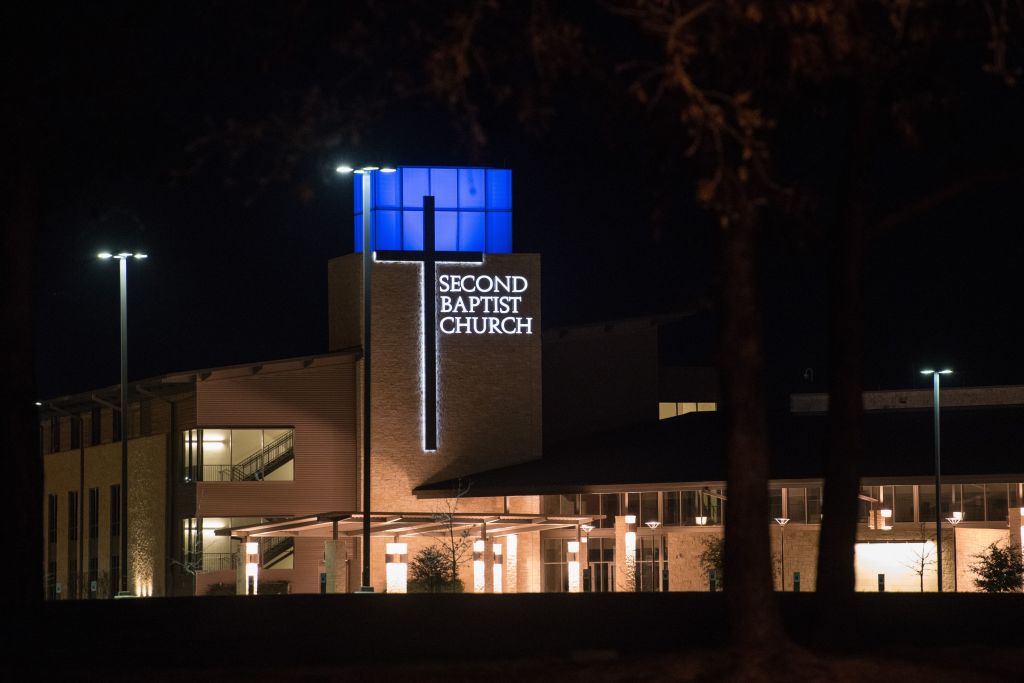Happy Tuesday! We have a very special edition of Dispatch Live (🔒) tonight at 7:30 p.m. ET: Steve will be joined by Fred Ryan—former publisher of the Washington Post, co-founder and CEO of Politico, onetime chief of staff to former President Ronald Reagan, and current chairman of the Ronald Reagan Presidential Foundation and Institute.
Ryan is also the author of Wine and The White House: A History, a book about the wines presidents have served. We’ll give you one guess what Steve wants to talk to him about. Members should keep an eye out for an email later today with info about how to tune in.
Quick Hits: Today’s Top Stories
- Israeli Prime Minister Benjamin Netanyahu officially dissolved his government’s War Cabinet on Monday, a decision that appeared imminent after Benny Gantz, leader of the centrist National Unity party, resigned in protest last week over the government’s handling of the war in Gaza. Netanyahu had initially formed the War Cabinet days after Hamas’ October 7 attack on Israel, and recruited Gantz—a longtime political rival—in an effort to present a united front. Right-wing National Security Minister Itamar Ben Gvir had been lobbying Netanyahu to join the War Cabinet following Gantz’s departure, but Netanyahu opted to disband the body instead. Netanyahu’s office told the Times of Israel the prime minister will hold “small ad hoc consultations with other relevant officials” to make decisions about the war effort.
- Russian President Vladimir Putin accepted an invitation from North Korean leader Kim Jong Un to travel to Pyongyang, the country’s capital, on Tuesday to discuss expanding military cooperation efforts between the two countries. The two-day visit will mark the first time Putin has traveled to North Korea since 2000, though the two authoritarian leaders met in Russia in September. Putin is reportedly seeking conventional weapons supplies from North Korea to aid in Russia’s invasion of Ukraine, while Kim is eyeing assistance in upgrading North Korea’s weapons systems and possibly in developing its nuclear arms program. Pyongyang has apparently already provided Moscow with additional ammunition for its war in Ukraine, and in exchange, Putin provided Kim with technology to boost North Korea’s spy satellite program.
- Democratic Senate Majority Leader Chuck Schumer announced Sunday that the upper chamber will vote this week on a federal bump stock ban. On Friday, the Supreme Court overturned a Trump-era executive action banning bump stocks, holding that the firearm accessory does not transform a rifle into a machine gun and that the Justice Department had overreached in banning them. “I call on Congress to ban bump stocks, pass an assault weapon ban, and take additional action to save lives,” President Joe Biden said Friday in response to the Supreme Court decision. “Send me a bill and I will sign it immediately.” It’s unclear whether the proposed ban will have the backing of Senate Republicans.
- Maryland’s Democratic Gov. Wes Moore on Monday pardoned an estimated 100,000 low-level offenders for crimes related to the possession and use of marijuana. “I’m ecstatic that we have a real opportunity with what I’m signing to right a lot of historical wrongs,” Moore said of the mass pardon in an interview with the Washington Post. Maryland joins nine other states in issuing mass pardons for low-level marijuana possession misdemeanors, but will not follow neighboring Virginia in automatically expunging convictions, leaving these misdemeanors on public court records.
- United States Surgeon General Vivek Murthy urged Congress on Monday to pass a requirement that social media platforms display a health warning label on their apps and websites, expressing concern about adolescents’ deteriorating mental health. “The mental health crisis among young people is an emergency,” Murthy wrote in the New York Times. “And social media has emerged as an important contributor.” Murthy issued a public health advisory about social media usage last May.
- The Department of Education’s Office of Civil Rights released a report on Monday detailing 75 instances of alleged antisemitic and Islamophobic harassment and discrimination at the University of Michigan, and an additional nine at the City University of New York (CUNY). The Department of Education found the schools did not do enough to create a safe environment for students during the anti-Israel protests on college campuses earlier this year, in violation of Title VI requirements to protect students against discrimination based on “race, color, or national origin.” The Department of Education tasked the schools with administering campus climate surveys and instituting training; Michigan agreed to monitoring by the Office of Civil Rights through the end of the 2026 school year and CUNY promised to reopen or initiate investigations in several alleged cases of discrimination.
- A United States Appeals Court announced Monday it will hear a lawsuit from the social media platform TikTok—and its Chinese-owned parent company ByteDance—against the United States on September 16. The company behind the popular video-based app contends that a federal law requiring ByteDance to divest its ownership of TikTok by January 2025 or face a nationwide ban—a provision included in the bipartisan national security and foreign aid package passed in late April—is an unconstitutional violation of its First Amendment rights.
- The government of the Czech Republic on Friday extradited Nikhil Gupta, an Indian national accused of plotting to kill an American citizen in New York who is active in the Sikh nationalist movement, to the United States. Gupta, who was apprehended in the Czech Republic in December, pleaded not guilty on Monday to murder-for-hire and conspiracy to commit murder-for-hire.
- The Boston Celtics defeated the Dallas Mavericks 106-88 in Game Five of the NBA Finals on Tuesday, winning the series 4-1 and securing their 18th national title. Celtics forward Jaylen Brown secured series MVP after averaging 20.8 points, 5.4 rebounds, and 5.0 assists over the five games.
‘We Got to Quit Arguing and Start Going Back to Work’

“Your enemy is not in this room,” Dean Inserra, a Southern Baptist pastor from Florida, told attendees of the denomination’s annual meeting in a sermon delivered last week, warning fellow Baptists against attacking their own members over political “side streets.”
The Southern Baptist Convention (SBC)—the country’s largest protestant Christian denomination, boasting nearly 13 million members and 46,906 affiliated churches—met in Indianapolis last week to elect a new president, consider a contested constitutional amendment regarding the role of women in the church, and define the denomination’s position on the morality of in vitro fertilization (IVF).
More than 10,000 representatives of SBC churches, known as “messengers,” attended the meeting, voting to elect Clint Pressley—the pastor of Hickory Grove Baptist Church in Charlotte, North Carolina—as the next leader of the denomination. The new president—who beat out five other candidates and secured 56 percent of the vote in a two-way run-off—is known as a theological and political conservative within the convention, according to sources within the SBC with whom TMD spoke on the condition of anonymity, but he’s also less focused on politics than other vocal conservatives in the SBC, like Albert Mohler Jr., the president of the Southern Baptist Theological Seminary.
“We got to quit arguing and start going back to work,” Pressley said last week, emphasizing the need for unity in the SBC and a renewed focus on evangelism and the church’s mission. “I think that’s part of what the president’s job is: To do all you can by way of influence to make sure as a convention of churches we are focused [on] what our mission is.”
In recent years, the denomination has been rocked by an ongoing sexual abuse scandal. The convention approved a series of reforms at its meeting in 2022 to address sexual abuse, but the denomination has yet to implement planned changes—like a database of credibly accused pastors, employees, and volunteers for congregations to review before hiring staff. Victims of abuse and members of the Abuse Reform Implementation Task Force have expressed frustration with the barriers the reforms have faced. “We took this work as far as we were allowed to take it,” Josh Wester, the chair of the task force, said last week. The convention last week voted to affirm the task force’s recommendations and transfer responsibility for implementing them to the SBC’s executive committee.
In a denomination that believes in congregational autonomy and is composed of independently governed churches over which the convention exercises no formal authority, finding unity can be challenging. Churches voluntarily agree to be in “friendly cooperation” with the convention, pooling resources through the SBC’s Cooperative Program. The SBC can end cooperation with churches that don’t abide by the convention’s statement of faith, however, and it has done so in recent years over debates regarding the role of women in church leadership—the most discussed issue heading into this year’s convention.
Messengers at the convention voted down an amendment to the SBC constitution that sought to more strictly enforce the denomination’s view that only qualified men can serve as pastors in the church. Sixty-one percent voted for the change, but the measure fell short of the two-thirds majority required for amendments. Known as the Law Amendment—after a Virginia pastor, Michael Law, who first introduced the amendment at the 2022 annual meeting—the proposal would add an additional stipulation in the constitutional requirements for churches to be in cooperation with the convention: allowing “only men as any kind of pastor.”
The SBC’s statement of faith currently bars female pastors and the constitution already requires churches in cooperation with the convention to have “a faith and practice which closely identifies” with the statement of faith. Proponents of the amendment argued that it’s necessary to reaffirm the complementarian position—that men and women were meant for distinct but complementary roles—through a constitutional provision given the high-profile ejections of some churches from the convention for ordaining female pastors. The SBC voted just last week to eject the First Baptist Church of Alexandria, Virginia, for allowing women to serve as senior pastors.
Critics of the amendment pointed to the ejections as evidence that the measure is not necessary and argued that the language “any kind of pastor” is vague and risks upending the roles of women in church that are consistent with the SBC’s statement of faith. Pressley supported the amendment but said after the vote that its outcome doesn’t signal a shift away from the SBC’s view of men and women in the church. “It’s not necessary [in order] for our convention of churches to maintain a real sense of complementarianism,” the new president said at a press conference on Wednesday. “We are just as complementarian as we were before that vote ever came into play.” Indeed, 92 percent of messengers at the convention affirmed that churches with female pastors should not remain part of the SBC.
The convention’s resolution on IVF signaled less consensus on an issue that has become a feature of public debate in the wake of an Alabama Supreme Court ruling concerning legal protections for frozen embryos. The resolution stated that IVF “routinely generates more embryos than can be safely implanted … [and] most often participates in the destruction of embryonic human life.” It called on “Southern Baptists to reaffirm the unconditional value and right to life of every human being, including those in an embryonic stage, and to only utilize reproductive technologies consistent with that affirmation especially in the number of embryos generated in the IVF process.” Such resolutions are non-binding and serve as expressions of the SBC’s official stance on issues.
The convention had never passed a resolution on IVF before, and the SBC leaders who worked on the statement seem aware that many Southern Baptists don’t consider the destruction of embryos during IVF treatment to be morally objectionable—as a form of abortion—even though the denomination is staunchly pro-life and believes life begins at conception. “For some people, it may be the first time they’ve started to draw some of these connections,” said Jason Thacker, a senior fellow at the Ethics and Religious Liberty Commission, the public policy arm of the SBC, who advised the resolutions committee on the IVF statement. “Southern Baptists and pro-life Christians in general, when they slow down to consider the ethical ramifications of the production and commodification of children, will land exactly where this resolution lands.”
But many in the denomination believe that IVF can be used ethically, and some messengers shared their positive experiences with the treatment. “I’m against the idea that this technology is so wicked that it cannot be employed,” said Zach Sahadak, an Ohio messenger who told the convention he and his wife had one child through IVF and are now expecting another using the same method. Sixty-three percent of white evangelicals believe access to IVF is a good thing, according to an April Pew Research Center poll. A separate Pew survey last year found that 44 percent had used some form of fertility treatment to have children, or knew someone who had.
In Washington, Republican senators—the vast majority of whom are pro-life—backed away from the SBC’s potentially divisive stance on such a popular issue. All 49 members of the Senate GOP last week backed a statement put forward by Sen. Katie Britt of Alabama and Sen. Ted Cruz of Texas reaffirming support for fertility treatment. “We strongly support continued nationwide access to IVF, which has allowed millions of aspiring parents to start and grow their families.” With only a couple of exceptions, Senate Republicans that same day voted down a proposal from Senate Democrats that would have established a nationwide right to IVF services and made insurers cover them, arguing the phrasing of the bill was overly broad and could threaten religious liberty.
Pressley suggested last week that the debate on the issue inside the SBC and the broader Christian evangelical world will likely continue: “We’ve just not thought about it very much.”
Worth Your Time
- Responding to an article in the Economist, Noah Smith dug into how serious China’s scientific research lead is. “China’s domination of global science, either in terms of citations or spending, isn’t really quite as dramatic as the Economist article makes it out to be,” Smith wrote for his Substack, Noahpinion. “But in the applied physical sciences —especially in materials science, chemistry, and engineering—China has definitely zoomed ahead of the West. … An important question is whether the U.S. and its allies should shift spending out of biology and into materials science, engineering, and chemistry. … Changing that balance could be the key to competing with China in the applied physical sciences. Anyway, I think the reports of China’s scientific dominance shouldn’t be causing policymakers in the West to panic. But it’s becoming pretty undeniable that China has now taken a commanding lead in applied physical science research, and Western leaders need to ask themselves whether they can really afford to cede leadership in those fields.”
- Remember when Virginia’s Republican Gov. Glenn Youngkin was being touted as a possible last-minute, Trump-alternative, GOP presidential candidate? “Hardly a week went by when wealthy Republican donors, a Rupert Murdoch-owned outlet or both wouldn’t send a flare up over Virginia’s capital in hopes Gov. Glenn Youngkin would make a late entry into the GOP presidential primary,” Jonathan Martin reported for Politico. “That was then. That was before Youngkin’s all-in effort to take full control of Virginia’s Legislature flopped, before Virginia lost the next FBI headquarters to Maryland, and before Youngkin’s splashy deal to lure a new arena complex to Alexandria ended with the governor’s fellow D.C.-area dealmaker, sports owner Ted Leonsis, stating in the Washingtonian ‘I’m a living testament now to say it was easier, more efficient to do business in Washington, D.C., than it was in Virginia.’ … Now those financiers and the conservative-leaning press have made their peace, yet again, with Trump as the Republican standard-bearer. Youngkin is attempting to do the same.”
Presented Without Comment
NBC News: Trump Confuses the Name of His Doctor When Bragging About Taking a Cognitive Test
Former President Donald Trump on Saturday confused the name of his former White House physician just moments after he said President Joe Biden should take a cognitive test.
The mix-up happened as Trump bragged that he had “aced” a cognitive test. Trump also criticized Biden, saying, “I think he should take a cognitive test like I did.”
“I took a cognitive test, and I aced it. Doc Ronny—Doc Ronny Johnson,” Trump said, confusing the name of his White House physician, Dr. Ronny Jackson, now a member of the House. “Does everyone know Ronny Johnson, congressman from Texas? He was the White House doctor.”
Also Presented Without Comment
New York Post: Chuck Schumer Deletes Father’s Day Photo Tweet in Front of Grill After Critics Slam His Spatula Skills
In the Zeitgeist
Paul McCartney turns 82 today, and although it’s not exactly how he envisioned spending his golden years, he announced on Sunday his Got Back tour in Europe, featuring live performances in London, Manchester, Paris, and Madrid.
We’re a little disappointed he’s not performing stateside, but we can look back on when some unknown band called The Beatles played a recently released song written by McCartney and John Lennon on the Ed Sullivan Show 60 years ago:
Toeing the Company Line
- The Dispatch’s intern class is officially trained up and ready to get to work! Aayush Goodapaty will be working with us on TMD for the next few weeks, but we’d also like to officially welcome Cole Murphy, Anna Kriebel, Max Whalen, Leah Schroeder, Grant Lefelar, and Katelyn Cai to the team. Keep an eye out for their bylines!
- In the newsletters: Kevin explained (🔒) the economic efficiency of free trade policies, the Dispatch Politics crew reported on the Biden campaign’s efforts to woo disaffected Republicans, and Nick predicted (🔒) how each party will react if they lose in November.
- On the podcasts: On Advisory Opinions, Sarah and David explain how the media’s obsession with the outcomes of Supreme Court cases obscures the court’s complexity.
- On the site today: Kevin zeroes in on Donald Trump’s new tariff proposal, Chris dives into shifting presidential election trends, and Rebeccah Heinrichs argues the United States needs to update its nuclear warheads and weapon systems.
Let Us Know
Do you have any career advice for our new class of interns?












Please note that we at The Dispatch hold ourselves, our work, and our commenters to a higher standard than other places on the internet. We welcome comments that foster genuine debate or discussion—including comments critical of us or our work—but responses that include ad hominem attacks on fellow Dispatch members or are intended to stoke fear and anger may be moderated.
With your membership, you only have the ability to comment on The Morning Dispatch articles. Consider upgrading to join the conversation everywhere.